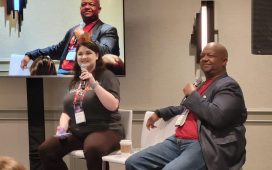In the past three years, the courtroom fate of more than 240 people in the UK – almost all young black men – has been decided, partly, by their taste in music, namely the genres of rap, grime and drill. This trend raises troubling questions of freedom of expression, racial prejudice and the place of art in court.
The data was uncovered by the University of Manchester’s Prosecuting Rap project, which has identified more than 70 trials since 2020 in which rap evidence including lyrics, music videos and audio recordings has been used to build prosecution cases. This was five times the rate recorded in the previous 15 years of rap music being introduced to secure convictions, apparently without much unease over the conflation of fiction with real-life crime.
While the music and videos may not be the only evidence, there is often alarmingly little other evidence against some defendants. Rap, grime and drill artists regularly win critical acclaim and top the charts. Yet Crown Prosecution Service guidelines state that “gangs are increasingly using drill music and social media to promote gang culture, glamorise the gang lifestyle and the use of weapons”.
The research reveals a pattern in which police officers are put forward by prosecutors to act as rap “experts” in court, advising juries what the rapper “really” means in lyrics, what hand gestures signify and what denotes gang membership. The human rights charity Justice has with very good reason described this as “no more than the prosecution calling itself to give evidence”.
The University of Manchester’s work reveals that the cases where rap is used in evidence involve young men (almost half of the trials featured defendants yet to turn 18); prosecutors relying on a gang narrative to shape their case, an approach often involving controversial joint enterprise laws; and instances of “bad character application”, when prosecutors introduce evidence of previous offences or, more vaguely, of a “disposition towards misconduct”.
Keir Monteith KC argued in the academic journal Popular Music that rap and drill lyrics should be banned in the courtroom. He asked: how can first‑person lyrics be taken for confessions? If a person appears in a video glorifying a gang, why does that make them members of it? If rapping about guns and gangs is evidence of a violent disposition, what can one say about Mick Jagger singing in Midnight Rambler that “I’ll stick my knife right down your throat, baby, and it hurts”? It is hard to disagree with the silk’s assessment that rap, drill and grime lyrics and videos are used against young, black defendants to build a narrative that reinforces racist stereotypes of black criminality.
There needs to be serious consideration about the way in which gang evidence, including music videos, is scrutinised. Surely juries ought to be given an indication of the degree of caution required when considering flimsy assertions about rap music? Abenaa Owusu-Bempah of the London School of Economics examined 38 cases where lyrics or participation in music videos had been used as evidence against a defendant or treated as an aggravating factor at sentencing – and found only one instance where this had been successfully challenged. Clearly the courts need a more rigorous and informed approach. The current use of musical preferences to infer criminality opens the door to miscarriages of justice.
-
Do you have an opinion on the issues raised in this article? If you would like to submit a response of up to 300 words by email to be considered for publication in our letters section, please click here.
READ SOURCE












